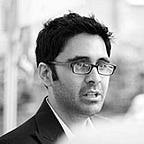A Day in the Life of a Better World
What It’s Going to Take to Fix This One
December 8, 2067
Dear Diary,
Today I decided that I want to be a doctor. It happened after Dr Jones and Dr Blake gave us a joint lecture on everything that went wrong in the last fifty years, and how we fixed it. They called it something like “How We Fixed the World.”
They told us that fifty years ago, the world had been falling apart: All its great systems were broken, and in the void they left behind, fascism was rising, countries were splitting, and people were desperately unhappy. And though it took decades, a few wars, and a lot of thinking and leadership, a newer, better system for expanding human possibility — because that’s all our political, economic, and social systems are really there for — emerged.
How so? Dr Blake said that just as it’s more efficient, cheaper and better, for a region to have a healthcare system than a city, and therefore for a country than a region, so it turned out to be more efficient to have one, well, for a lot of the world. First Canada allied its healthcare system with France, and then the EU joined it, and then they extended it further (democratically, of course). That doesn’t mean countries stopped having their own systems — just that a system above them helps manage them, and so now I can travel and not worry about getting sick, because I’m covered by the IHS. Well, not everywhere — it spreads across much of the world, but not the whole world, and we’ll get to that, because it’s an important of the story.
Dr Jones explained it was just like fighting climate change. A long time ago, in the 2010s, people still hadn’t really figured out that countries had to cooperate to solve their newest and biggest challenges. One country couldn’t do much to stop climate change — only all of them together. Not just for political reasons — but for economic ones: Dr Blake said something that stuck with me. All these questions they face during that era, he said, were about public goods.
The public good — things like climate, health, education, and transport, which are things that we share, hold in common. The public good is dominated by economies of scale: just like healthcare, or education, the more people that are in the…
